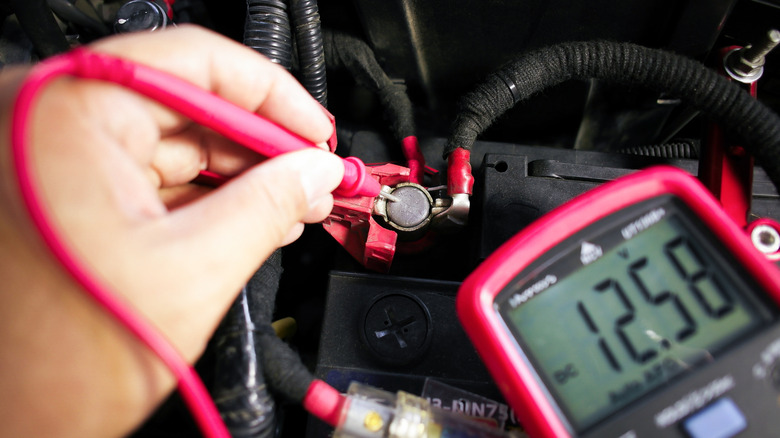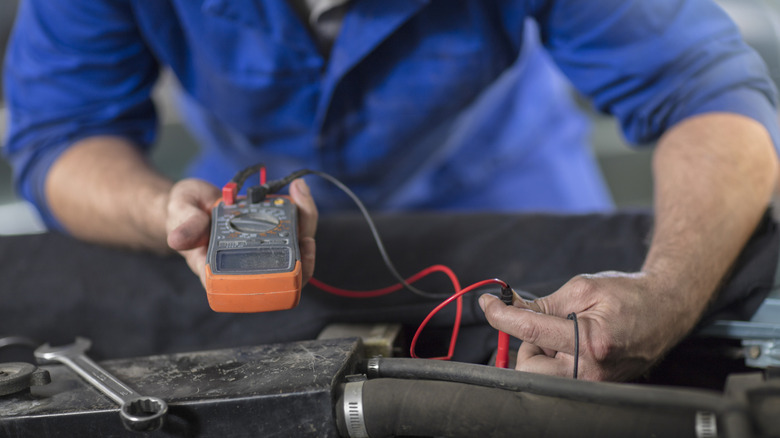Where You Can Get A Car Battery Tested (And How Often It Should Be Checked)
Car batteries tend to die at the most inconvenient moments, so periodic testing is the best way to avoid these troubles. Knowing what causes repeated battery failures can help you stay ahead of the problem. Car batteries should be tested every six months, ideally before summer and winter when extreme temperatures take their toll. A quick check can uncover early warning signs that might go unnoticed until you're left stranded. The DIY-minded may have a multimeter or a simple voltage tester for this purpose, but there are alternatives if you prefer to keep the tool count to a minimum. Importantly, these testing options are often free or available for a minimal cost.
Voltage is a good preliminary indicator of a battery's health. A level of 12.6 volts or higher indicates a fully charged battery, while 12.2 to 12.6 volts shows partial-charge status. A reading below 12.0 volts signals a discharged battery or one that can't hold a charge.
A more comprehensive check looks at the battery's ability to hold a charge, deliver cold cranking amps, and respond under load. "Under load" means when the battery is powering something, like the starter motor or lights. For an older battery or one with a low voltage reading, it's best to go to a local auto supply store for a more thorough test.
Where can you get a car battery tested?
If there's any good news about getting a car battery checked, it's that there are plenty of places to get it done for free. Most national auto parts stores, like AutoZone, Advance Auto Parts, O'Reilly Auto Parts, and NAPA, offer this service at no charge. After all, they'd love to sell you a new battery when the time comes. The process is simple: they'll connect a tester to the battery and give you an on-the-spot diagnosis.
An easier approach is to ensure a battery check is part of your car's regular servicing. Whether you get oil changes through an independent shop or a dealership, a multi-point inspection should include battery testing. Most car batteries only last three to five years, so catching a problem early can avoid needing a jump start or a tow truck.
As a last resort, you can contact a mobile mechanic or a roadside assistance service to test the battery in a driveway or parking lot. This won't be the cheapest way to check a battery's health unless you are in a motor club. However, going this route can be helpful if you're seeing signs of a bad alternator and want to confirm if a weak battery could be caused by this issue. A basic onsite evaluation using the same equipment for battery testing can determine if the alternator is an issue (although an alternator bench test may be required for a complete diagnosis).
How often should you test your car battery?
As mentioned, a car battery should be tested every six months. In a perfect world, this means before the start of summer and winter, as extreme temperatures can accelerate battery degradation. However, if your car's regular maintenance cycles don't coincide with the changing seasons, adding an extra battery check or two throughout the year can't hurt.
You may also need to test more frequently if the battery is over two years old. Otherwise, you're risking a no-start situation. Driving cycles consisting of multiple short trips can also accelerate battery aging. You'll want to consider all these factors when determining battery testing frequency.
Lastly, don't delay testing if you notice signs it's time to replace the car battery. These symptoms include a car that's hard to crank (or won't start) or flickering lights (inside or out). Another red flag is a bulging or swollen battery housing (a sign of internal damage), but this type of problem is best handled with a new battery rather than jump-starting or recharging.


